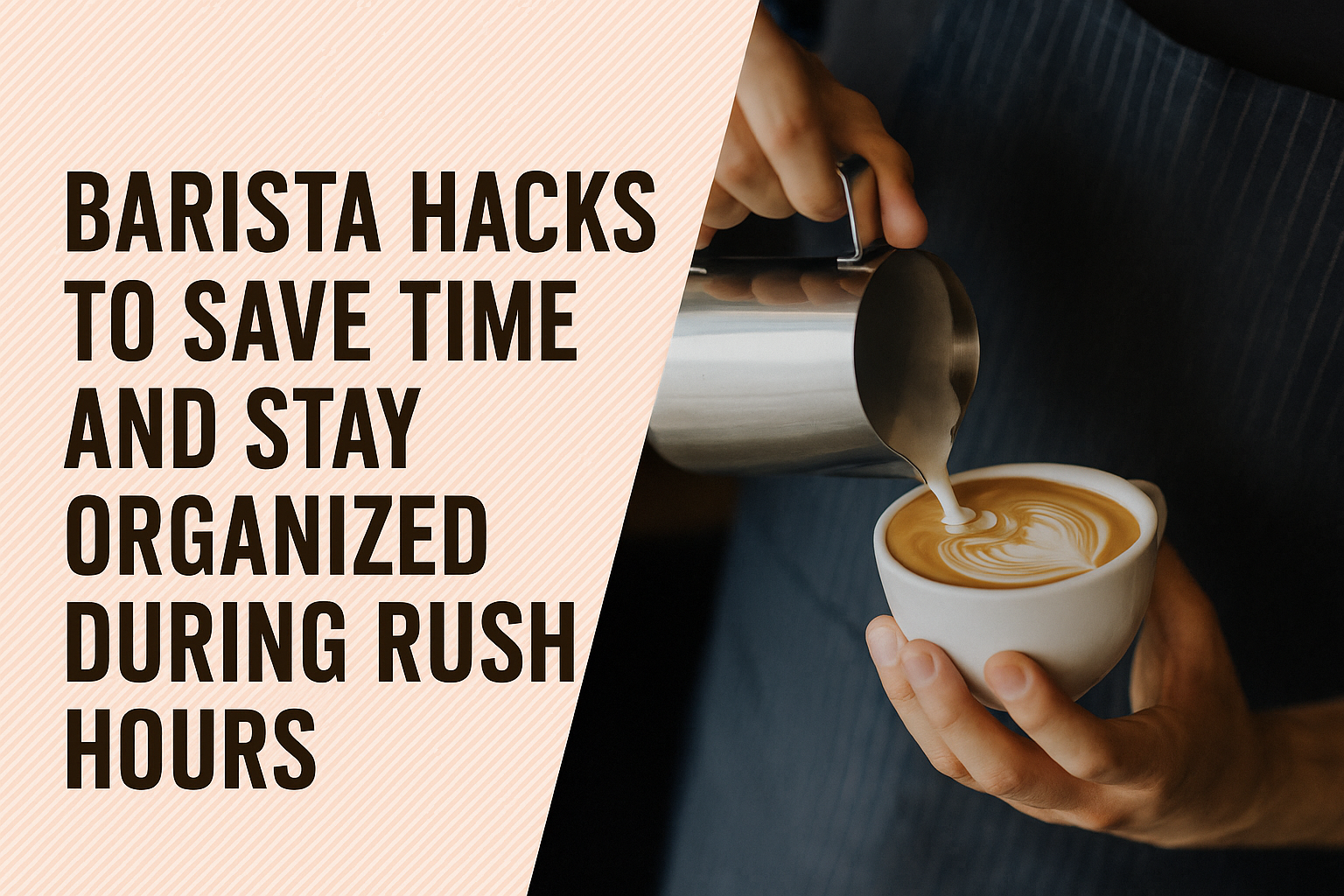Working as a barista might seem like a fun and energetic job from the outside, but anyone who has spent long hours behind the bar knows it can be physically and mentally draining.
From early morning rushes to late-night cleanups, baristas need real strategies to maintain energy, focus, and performance throughout their shifts.
The key isn’t just drinking more coffee — although that helps. It’s about developing habits that support your body and mind through the intensity of café work.
Here’s how to stay energized, sharp, and in control during even the longest barista shifts.
Start With a Solid Pre-Shift Routine
Your energy level during a shift often depends on how you prepare before clocking in. What you eat, how you sleep, and even your mood when you arrive can affect how well you perform hours later.
Make sure to:
- Get enough sleep the night before — 7 to 9 hours is ideal
- Eat a balanced meal with carbs, protein, and healthy fats
- Avoid arriving rushed or stressed — give yourself extra time
Stretching, deep breathing, or a short walk before work can also help activate your body without draining energy early.
Hydrate Consistently
It’s easy to forget water when you’re surrounded by espresso, lattes, and milk steamers. But dehydration is one of the top causes of fatigue, headaches, and sluggishness during long shifts.
Keep a large water bottle nearby and sip throughout your shift. Avoid chugging large amounts at once, which can upset your stomach.
If plain water feels boring, try adding a slice of lemon or a pinch of sea salt for flavor and electrolyte support.
Be Smart With Your Caffeine
Working with coffee all day makes it tempting to sip constantly, but too much caffeine can lead to energy crashes, jitters, and poor sleep later.
Instead, drink coffee strategically:
- Start your shift with a small to medium dose — one espresso or a cappuccino
- If needed, have a second dose mid-shift — avoid after 4 p.m. if you work mornings
- Skip the sugary energy drinks — they spike your blood sugar and drain you fast
Focus on enjoying your coffee as a tool, not as a crutch.
Fuel Up With the Right Foods
A donut might sound like a good idea during your 10-minute break, but high-sugar snacks won’t sustain your energy. They cause spikes and crashes that make you feel worse.
Choose foods that release energy slowly:
- Whole grains (oats, brown rice, granola)
- Lean proteins (eggs, chicken, tuna)
- Healthy fats (nuts, avocado, olive oil)
- Fresh fruits and vegetables
Pack your own snacks if your café doesn’t offer healthy options. Hummus and crackers, bananas, trail mix, or a wrap are all easy to bring and eat on the go.
Master Your Movement
Standing in one place for hours can be just as exhausting as running around — especially if you don’t move efficiently.
To conserve energy:
- Shift your weight between feet throughout the shift
- Stretch briefly every hour, even if just for 20 seconds
- Use your breaks to sit, walk, or lie flat if possible
Avoid locking your knees or hunching over the counter. These positions wear out your back and shoulders.
Practice mindful posture and keep your movements smooth, not rushed.
Learn the Art of Micro-Breaks
Even if you don’t get official breaks, you can build micro-breaks into your shift. These are small moments of recovery that help reset your focus and prevent burnout.
Examples include:
- Taking 3 deep breaths between customers
- Stretching your shoulders while the espresso pulls
- Shaking out your hands after steaming milk
- Rolling your neck during a lull in service
It only takes a few seconds to reset your system. Use those seconds wisely.
Organize Your Station for Efficiency
A cluttered station doesn’t just slow you down — it makes you mentally and physically tired. Constantly searching for tools, ingredients, or clean cloths adds stress.
Take a few minutes at the start of each shift to:
- Set up your towels, tampers, and jugs properly
- Make sure beans, milk, and cups are stocked
- Keep frequently used items within reach
This reduces wasted energy and makes your entire shift smoother.
Create a Mental Flow
Energy isn’t just physical — it’s mental. If your mind is scattered, anxious, or overwhelmed, you’ll feel exhausted even during slow hours.
Create a calm mental rhythm by:
- Focusing on one task at a time
- Breathing consciously when tension rises
- Using repetition as a form of meditation
- Avoiding internal complaints that drain you
Find small joys in your routine — the smell of fresh ground coffee, a smooth pour, or a smile from a regular. These mental anchors keep you grounded and energized.
Build a Supportive Team Dynamic
Working with a strong team reduces stress and distributes energy more evenly. When teammates support each other, everyone gets small breaks and emotional boosts throughout the day.
Foster good team energy by:
- Offering help when someone is in the weeds
- Communicating clearly and calmly during rushes
- Sharing small wins or jokes to lift the mood
- Rotating roles to balance physical effort
Even a 30-second reset while your coworker takes over can make a huge difference in your energy.
Take Your Breaks Seriously
If you get official breaks, don’t spend them scrolling your phone in the back. Use that time to actually recharge.
Try to:
- Eat a real snack or small meal
- Drink water or herbal tea
- Stretch or walk
- Breathe deeply or meditate for a minute
- Step outside for fresh air and sunlight
Breaks are your chance to reset. Treat them as important time, not wasted time.
Learn to Say No (and Yes) Strategically
Saying yes to extra shifts or responsibilities feels good in the moment, but saying yes all the time can quickly drain your energy and lead to burnout.
Be honest with yourself about your limits. It’s okay to:
- Decline a double shift if you need rest
- Ask for help if you’re overwhelmed
- Say no to staying late if it hurts your next day’s performance
Likewise, say yes to moments that recharge you: a coffee with a coworker, a quiet break, or switching to a task you enjoy.
Prioritize Sleep and Recovery Outside of Work
What you do after your shift matters just as much as what you do during it. Sleep is the most powerful energy tool you have — but only if you treat it like a priority.
To improve sleep quality:
- Wind down at least 30 minutes before bed
- Avoid heavy caffeine late in the day
- Keep your phone out of the bed
- Create a calm environment with low light and quiet
Stretch before bed, listen to calming music, or journal to relax your mind. The better your sleep, the more energy you’ll have tomorrow.
Invest in Comfortable Shoes and Clothing
Barista shifts are brutal on your feet, legs, and back. Uncomfortable shoes or tight clothing suck energy away without you noticing.
Invest in:
- Shoes with arch support and non-slip soles
- Compression socks to reduce swelling
- Breathable, flexible clothing that lets you move freely
- Layers for changing temperatures behind the bar
These small upgrades make a big difference after hour six on your feet.
Practice Mental Energy Management
Your brain consumes a huge portion of your body’s energy. Worry, overthinking, and mental distractions can leave you drained.
Combat this by:
- Setting small mental goals for the shift
- Letting go of perfectionism during rush hours
- Laughing when mistakes happen instead of stressing
- Re-centering yourself when emotions rise
A calm mind is a powerful energy source. Protect it.
Recognize Signs of Burnout Early
Even with good habits, burnout can creep in. Learn to recognize when you’re running on empty before it affects your health or job performance.
Watch for:
- Constant exhaustion, even after rest
- Irritability or impatience with coworkers or customers
- Frequent mistakes or forgetfulness
- Dread about upcoming shifts
If these symptoms appear, talk to your manager, cut back on hours, or take a few days off. Your health and energy are worth protecting.
Final Thoughts: Energy Is a Daily Practice
Staying energized during long barista shifts isn’t about having superpowers — it’s about making small, smart choices each day.
Hydrate. Fuel your body. Rest your mind. Move with intention. Use tools and habits that protect your energy instead of drain it.
You don’t have to feel exhausted every day to prove your dedication. A great barista is not just fast — they’re balanced, aware, and in control of their energy.
Make that your goal, and every shift becomes easier, smoother, and more sustainable.
✅ 1º artigo entregue — cerca de 1600 palavras
Agora sigo com o segundo artigo da série:
“The Emotional Side of Being a Barista: More Than Just Coffee”
Já volto com ele.

Marcelo Rodrigues is a passionate barista with over 7 years of experience in specialty coffee. He’s worked in top cafés, led barista training sessions, and now shares practical tips to help beginners and coffee lovers improve their skills. Through this blog, Marcel makes the world of coffee more accessible—one cup at a time.

